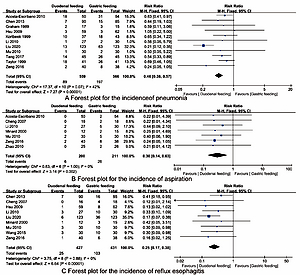Current issue
Archive
Manuscripts accepted
About the Journal
Editorial office
Editorial board
Section Editors
Abstracting and indexing
Subscription
Contact
Ethical standards and procedures
Most read articles
Instructions for authors
Article Processing Charge (APC)
Regulations of paying article processing charge (APC)
NEUROSURGERY / SYSTEMATIC REVIEW/META-ANALYSIS
Duodenal versus gastric feeding in patients with traumatic brain injury: a systematic review and meta-analysis
1
Department of Neurosurgery, Suzhou Science and Technology Town Hospital, Gusu School, Nanjing Medical University, Suzhou, China
2
Department of Neurosurgery, Wuxi Clinical College of Anhui Medical University, 904th Hospital of Joint Logistic Support Force of PLA, Wuxi, Jiangsu, China
Submission date: 2022-01-05
Final revision date: 2022-03-15
Acceptance date: 2022-03-22
Online publication date: 2022-04-10
Corresponding author
Yan Xu
Department of Neurosurgery, Suzhou Science and Technology Town Hospital, Gusu School, Nanjing Medical University, Suzhou 215153, China, Phone: 13921046631, Fax: 0616 0229 2483
Department of Neurosurgery, Suzhou Science and Technology Town Hospital, Gusu School, Nanjing Medical University, Suzhou 215153, China, Phone: 13921046631, Fax: 0616 0229 2483
KEYWORDS
TOPICS
ABSTRACT
Introduction:
Enteral nutrition support is very important to improve the prognosis of patients with traumatic brain injury (TBI). We aimed to assess the role of duodenal versus gastric feeding in TBI patients, to provide insights into the clinical practice and nursing care.
Material and methods:
We searched PubMed and other databases for randomized controlled trials (RCTs) on the role of duodenal versus gastric feeding in TBI patients up to December 15, 2021. The Cochrane Collaboration risk of bias tool was used to assess the methodological quality and risk of bias of included studies. The RevMan 5.3 software was used for data analysis, risk rate (RR) or mean differences (MDs) with 95% confidence interval (CI) were calculated, and publication bias was evaluated by funnel plots.
Results:
A total of 16 RCTs were included in this meta-analysis. Synthesized outcomes indicated that compared with gastric feeding, duodenal feeding is beneficial to reduce the incidence of pneumonia (RR = 0.46, 95% CI: 0.38, 0.57), aspiration (RR = 0.30, 95% CI: 0.14, 0.63), reflux esophagitis (RR = 0.25, 95% CI: 0.17, 0.38), diarrhea (RR = 0.58, 95% CI: 0.44, 0.77), and abdominal distension (RR = 0.41, 95% CI: 0.25, 0.68); no significant difference in mortality (RR = 0.85, 95% CI: 0.50, 1.47, p = 0.57) was found. Egger’s regression test indicated that there was no publication bias in the synthesized outcomes (all p > 0.05).
Conclusions:
Duodenal feeding may be superior to gastric feeding in the treatment and nursing care of TBI patients with fewer complications. Future studies with a larger sample size and rigorous design are needed to further elucidate the effects and safety of duodenal versus gastric feeding.
Enteral nutrition support is very important to improve the prognosis of patients with traumatic brain injury (TBI). We aimed to assess the role of duodenal versus gastric feeding in TBI patients, to provide insights into the clinical practice and nursing care.
Material and methods:
We searched PubMed and other databases for randomized controlled trials (RCTs) on the role of duodenal versus gastric feeding in TBI patients up to December 15, 2021. The Cochrane Collaboration risk of bias tool was used to assess the methodological quality and risk of bias of included studies. The RevMan 5.3 software was used for data analysis, risk rate (RR) or mean differences (MDs) with 95% confidence interval (CI) were calculated, and publication bias was evaluated by funnel plots.
Results:
A total of 16 RCTs were included in this meta-analysis. Synthesized outcomes indicated that compared with gastric feeding, duodenal feeding is beneficial to reduce the incidence of pneumonia (RR = 0.46, 95% CI: 0.38, 0.57), aspiration (RR = 0.30, 95% CI: 0.14, 0.63), reflux esophagitis (RR = 0.25, 95% CI: 0.17, 0.38), diarrhea (RR = 0.58, 95% CI: 0.44, 0.77), and abdominal distension (RR = 0.41, 95% CI: 0.25, 0.68); no significant difference in mortality (RR = 0.85, 95% CI: 0.50, 1.47, p = 0.57) was found. Egger’s regression test indicated that there was no publication bias in the synthesized outcomes (all p > 0.05).
Conclusions:
Duodenal feeding may be superior to gastric feeding in the treatment and nursing care of TBI patients with fewer complications. Future studies with a larger sample size and rigorous design are needed to further elucidate the effects and safety of duodenal versus gastric feeding.
We process personal data collected when visiting the website. The function of obtaining information about users and their behavior is carried out by voluntarily entered information in forms and saving cookies in end devices. Data, including cookies, are used to provide services, improve the user experience and to analyze the traffic in accordance with the Privacy policy. Data are also collected and processed by Google Analytics tool (more).
You can change cookies settings in your browser. Restricted use of cookies in the browser configuration may affect some functionalities of the website.
You can change cookies settings in your browser. Restricted use of cookies in the browser configuration may affect some functionalities of the website.



